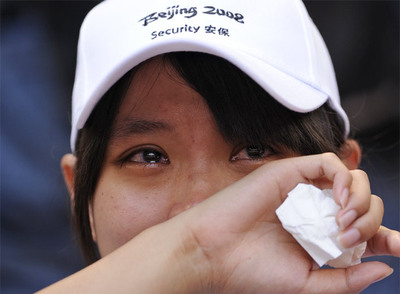 |
| Liu Xiang became in Athens-2004 the first male Chinese Olympic champion in athletics ever Photo: Donald Miralle/ Getty Images http://www.the2012londonolympics.com/forum/beijing-2008-olympic-games-news/1991-fatigued-liu-xiang-save-energy-2008-olympic-games.html |
Not only veteran champions but quite a lot young hopefuls likewise have been sidelined recently. Bai Xue, the surprising winner at the World Championship marathon in Berlin , after two years with recurring injuries, made a desperate attempt to qualify for London
Nevertheless, maybe the most remarkable comeback, because of all he represents for a country of 1.3 billions of people, is the one of hurdler Liu Xiang. The man who became the first Asian athlete in winning an Olympic gold medal in sprints and also the first male Chinese in doing so in any track and field event at Athens 2004, had to endure four years later the bitter experience of letting down a crowd of 90.000 spectators and the dreams of a whole nation, when he exited the Bird Nest Olympic stadium, without even having the chance of competing.
Nevertheless, maybe the most remarkable comeback, because of all he represents for a country of 1.3 billions of people, is the one of hurdler Liu Xiang. The man who became the first Asian athlete in winning an Olympic gold medal in sprints and also the first male Chinese in doing so in any track and field event at Athens 2004, had to endure four years later the bitter experience of letting down a crowd of 90.000 spectators and the dreams of a whole nation, when he exited the Bird Nest Olympic stadium, without even having the chance of competing.
 |
| A volunteer is in tears after Liu Xiang withdrawal from Beijing Olympic Games Photo: Associated Press http://elpais.com/diario/2008/08/19/deportes/1219096806_850215.html |
Liu Xiang, the son of a truck driver, entered sport as a high jumper but, in spite of winning the national championship of his age, a bone test showed (wrongly) he was not to be tall enough for the event so he was invited to give it up. (1) However, the kid from the Putuo district of Shanghai was determined to participate one day at the Olympic Games so he tried other specialties until renowned coach Sun Haiping, who had mentored Asian champion Chen Yanhao, spotted his talent for the hurdles in 1998. Famously, the young athlete’s parents wanted their son to concentrate in a College career as Computer Engineering instead of wasting his time in what they believed something without a future, so Sun had to make several visits to convince them. From then on, Liu Xiang’s progress over the hurdles was meteoric. After only three years practising the event he went on to break the world youth best, then the world junior record one year later in a meeting in Lausanne, with a clocking of 13.12 which stands to date. In his first senior season, Liu won a remarkable bronze medal at the World championships in Saint Denis and he followed it up with silver in Budapest 12.91 in the process.
The gold medal Liu Xiang won in Athens was not really the first one in track and field for China China Athens
According to Wang Xiaoshan, a journalist of Sports Illustrated, Liu is on the frontline of a 30-year campaign to rebuild national confidence, based in investments in order to obtain sportive success. Since China was back to the Olympic Games in Los Angeles China China
Besides, Liu Xiang had something else: a special charisma and a personality which fits with the new image China
 |
| Liu Xiang in pain, shortly before withdrawing from his 100m hurdles heat at Beijing Olympic Games Photo: Adrian Dennis/ AFP/ Getty Images http://www.theepochtimes.com/n2/sports/liu-xiang-withdrawal-premediated-3016.html |
 |
| Liu Xiang and Dayron Robles before their last clash at the Birmingham indoor meeting in February http://www.runblogrun.com/ |